Are you on Team Magento or Team WordPress?
Dive right into the heart of the debate between Magento and WordPress, two powerhouse platforms that have been making waves in the digital ocean. Both are robust, scalable, and open-source, offering initial free versions (though, don't forget, you'll need to cover your hosting) and unlocking further potential for those willing to invest a bit more. But here comes the big question:
What really distinguishes Magento from WordPress? Think of Magento as your go-to business buddy, tailored to boost sales and designed for those who live and breathe eCommerce.
In contrast, WordPress is like that super charismatic friend who knows how to light up your website's presence, perfect for content-driven sites and marketing your online persona or business. Yes, WordPress can flex its eCommerce muscles with plugins, but it doesn’t pack this punch straight out of the box like Magento.
In this article, we're about to take you on a no-holds-barred journey, weighing the good, the bad, and the unique aspects of each platform. We'll pit them against each other in the categories that count, helping you figure out which contender deserves the crown for your specific needs. And for those fast-trackers out there, here's a quick sneak peek:
Ready to rumble? Let’s jump into the fray and dissect what each of these contenders brings to the table!
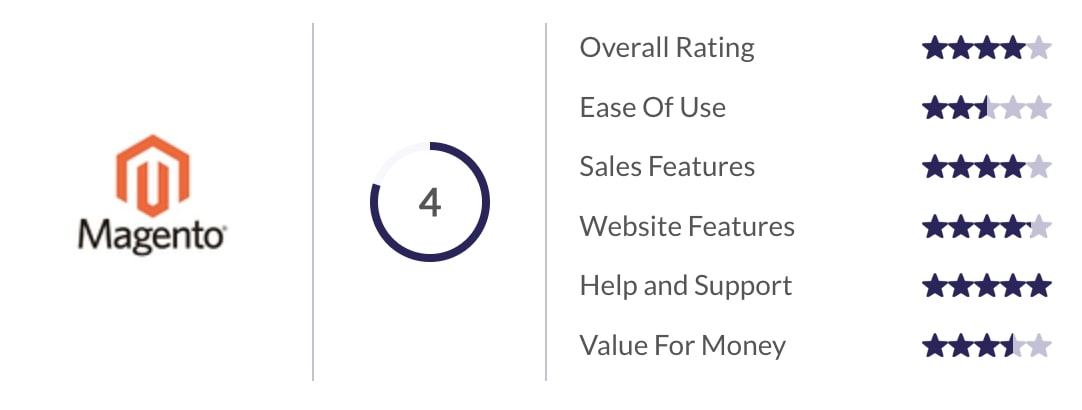
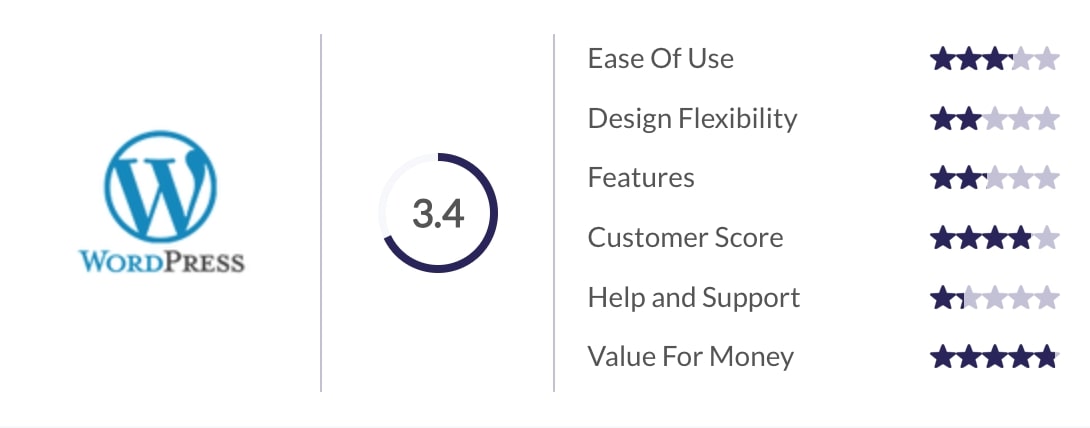
Magento vs WordPress: Unveiling the Titans!
So, who are these digital giants known as Magento and WordPress?
Picture Magento as an enterprise-grade eCommerce juggernaut, ideal for hefty websites craving sophisticated features. It's not the friendliest kid on the block, demanding a solid grasp of tech-savviness or a budget ready to fund a Magento maestro who can unleash your site's full prowess. And the zenith of that prowess? A staggering $100 billion in gross merchandise volume annually. If boosting eCommerce sales is your game, Magento is the name.
A little heads-up on the financial front: WordPress waves a 'free entry' sign, and here, we're stacking it against Magento Open Source, the popular no-cost variant of Magento. But Magento has more cards up its sleeve with the premium Magento Commerce and Magento Commerce Cloud, tailored for the big league players with tech arsenals at their disposal.
Enter WordPress, the more budget-friendly and less tech-intimidating counterpart. Unlike the resource-hungry Magento, WordPress adjusts its power to match your needs. It's a playground for DIY enthusiasts and professional developers alike, offering a 'start small and expand' approach. But don't be fooled; a little coding know-how will still serve you well! If weaving compelling content to market your site is your strategy, WordPress is your ally.
Choosing between Magento and WordPress doesn't mean trading off eCommerce muscle for content marketing finesse, or the other way around. Both platforms are Jacks-of-all-trades in their own right.
However, each boasts its unique strength. The decision lies in which one resonates more with your digital aspirations!
Pros and Cons
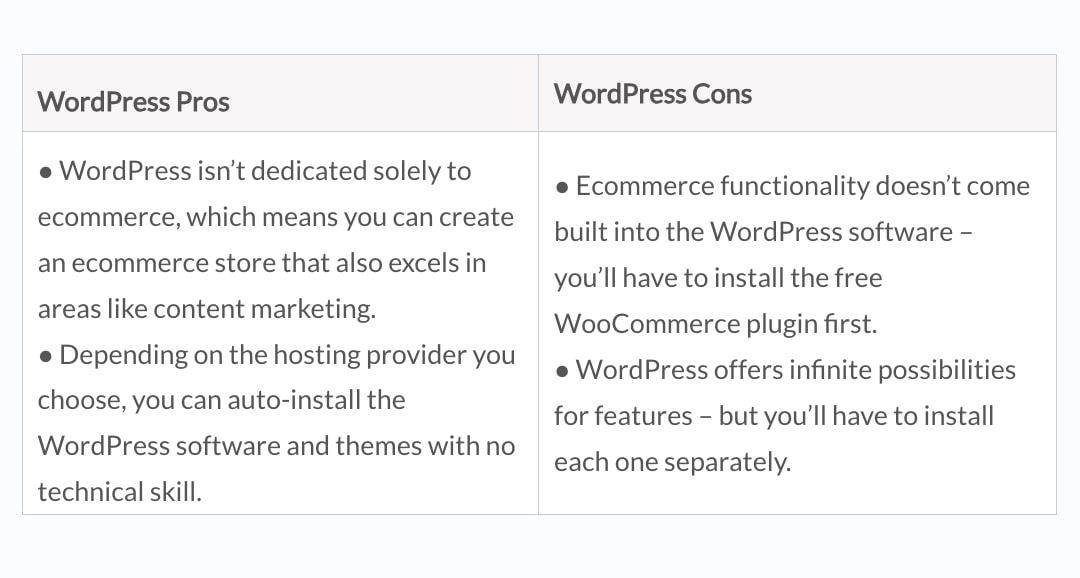
Dive into the world of WordPress, where it's not all about eCommerce, opening up a realm where your online store can wield the power of content marketing like a pro. It's a landscape filled with versatility, where eCommerce marries compelling storytelling.
But wait, there's more magic to it! Depending on your choice of hosting ally, WordPress can almost read your mind, auto-installing its software and themes, sparing you the technical wizardry normally required. It's like having a digital fairy godmother!
However, every rose has its thorns:
When it comes to WordPress, eCommerce isn't in its DNA; you'll need to summon the power of the free WooCommerce plugin to transform your site into a bustling online marketplace. Ready for limitless possibilities? WordPress says, 'Bring it on!' But here's the catch - each feature is a world of its own, requiring individual installation.
So, there you have it. WordPress, in all its glory, offers a universe of potential, but it demands a hands-on approach. Whether it's the perfect fit for you depends on how ready you are to embrace its 'piece-by-piece' philosophy!
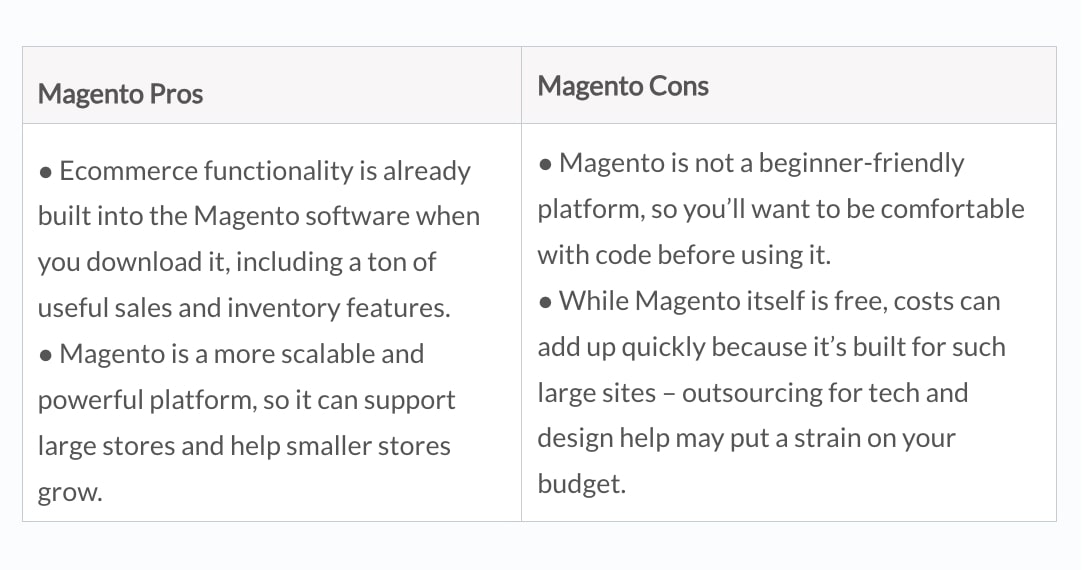
Welcome to the world of Magento, where eCommerce functionality is a standard part of the package. Right off the bat, Magento comes equipped with a comprehensive set of sales and inventory features, ready to support your business operations.
What's more, Magento stands out as a robust, scalable platform, making it an ideal choice for large online stores while also providing the necessary tools for smaller shops to expand.
However, it's not all smooth sailing:
Navigating Magento can be quite the challenge for beginners. You'll need to be conversant with coding to truly get to grips with it. Additionally, while Magento's core offerings are available at no cost, there's a catch. Because it's designed for extensive, complex sites, the expenses can pile up. Whether it's for additional functionality, design customization, or technical adjustments, the costs can escalate, potentially stretching your budget.
In summary, Magento offers a powerful, growth-ready platform for those prepared to handle its technical demands and operational costs. It's a solid option for those eyeing aggressive expansion and sophisticated online retail operations.
Magento vs WordPress: Diving into Distinctions
Let's ascend to the peak of clarity in the Magento versus WordPress debate!
Ease of Use: Here's the deal: WordPress takes the cake for simplicity. Crafted with both novices and developers in mind, it's the go-to for accessible site-building. Magento, on the other hand, caters to the tech-savvy crowd—professional developers or big businesses capable of hiring top-tier web development talent. It's no surprise then that Magento garnered a modest 2.5/5 in our ease-of-use research, trailing behind WordPress's more comfortable 3.3.
What about installation? Breathe easy! Several web hosts have got you covered with hassle-free setups for both platforms. Take Bluehost, for example—it offers a seamless, one-click WordPress installation. Just sign up, sit back, and let them do the heavy lifting—it's complimentary with your Bluehost account. Plus, with a nod from WordPress itself, you can rest assured you're in good hands.
For the Magento enthusiasts, SiteGround stands out, promising straightforward installation within a handful of clicks. However, a heads-up for the beginners—the process might still seem a tad technical.
Ecommerce: When it comes to eCommerce prowess, Magento flexes its muscles as the more fortified platform, though it's a close race with both contenders being eCommerce stalwarts. Magento is brimming with top-notch sales features right out of the box, including perks like:
- Tracking for recently viewed and compared items
- Options for free shipping
- Customizable price points for diverse customer groups (hello, wholesalers and retailers!)
- The ability to upload multiple images per product
- A streamlined one-page checkout process
Considering the vast ocean of over two billion online shoppers, the eCommerce horizon is ripe with growth opportunities—and Magento is well-equipped to sail these waters!
Conversely, WordPress has its own eCommerce arsenal—it just requires a bit of assembly. By integrating the WooCommerce plugin, you can gear up your WordPress site for an eCommerce extravaganza, driving sales without the steep technical learning curve that Magento necessitates.
In essence, whether you choose Magento or WordPress, you're positioning your eCommerce venture on a platform built for success. The deciding factor? It hinges on your comfort with technology and your specific business needs.
Marketing Prowess and Content Mastery
When it comes to marketing and content management, WordPress stands a head taller than Magento. In the digital realm, WordPress reigns as a bona fide content management system. What started as a humble blogging platform has blossomed into a versatile website builder. Yet, its blogging roots run deep, empowering WordPress to juggle colossal volumes of content and media with grace. Magento, in contrast, requires a custom extension to even dip its toes into blogging, as it's not a native feature.
The Battle of Themes and Design Flexibility
In the design arena, both WordPress and Magento flex their creative muscles, but the ideal theme for you hinges on your site's nature. Each platform parades an array of ready-to-roll themes that spare you the coding conundrum, alongside custom themes that beckon for a developer's deft touch. The trade-off? Ready-made themes are your budget-friendly, easy-going companions, while custom themes offer the allure of superior quality and distinctiveness.
For the WordPress aficionados, the WooCommerce Storefront theme emerges as the crown jewel of free options. This user-friendly theme, offering seamless integration with WooCommerce, ensures your content shines without sidelining your sales ambitions. Opt for a WooCommerce-centric plan from Bluehost, and you'll find the Storefront theme greeting you right at the doorstep.
Conversely, Magento champions often lean towards splurging on paid, tailor-made themes, especially to complement their expansive, enterprise-grade sites. These larger eCommerce fortresses are typically primed to allocate funds for a custom theme, with prices ranging from a steep $600 to a whopping $25,000.
In essence, whether you're team WordPress or team Magento, your site's aesthetic and functional appeal is well catered for. It all boils down to your site's requirements and your readiness to invest in its digital charisma.

Magento vs WordPress: The Shared Threads
Ascend to clarity as we unravel the commonalities between Magento and WordPress.
Guardians of Security: One might leap to the conclusion that Magento, with its eCommerce-centric DNA, would be the fortress of security, especially when compared to WordPress. Yet, the reality is both platforms stand as vigilant sentinels, ensuring top-notch security for eCommerce endeavors and beyond.
Having weathered the digital storms for years, both Magento and WordPress have been fortified with numerous security updates. Their arsenals are further augmented by a plethora of plugins and extensions, designed to bolster your site's defenses. However, a pivotal factor in this security equation is the hosting provider.

Consider stalwarts like Bluehost and SiteGround, which bestow upon their users the gift of free SSL certificates. These certificates act as guardians, ensuring data's safe passage from a user's realm to your digital fortress.
But the security offerings don't end there. Bluehost patrons can avail themselves of SiteLock security at a preferential rate. Think of SiteLock as your digital knight, ever-vigilant against malware threats and potential breaches. Meanwhile, SiteGround employs an Intrusion Prevention System, adept at spotting and thwarting any unsavory attempts to compromise passwords.
A word to the wise: both WordPress and Magento continually evolve, releasing newer, more secure versions. It's imperative to stay vigilant, ensuring timely updates to shield your digital realm from potential adversaries.
The Beacons of Support:
Both WordPress and Magento beckon users to their community-driven support forums (WordPress Support and Magento Forums). Here, one can delve into a treasure trove of insights, gleaning wisdom from global users spanning various expertise levels. Given their longstanding presence and immense popularity, even if the official forums leave you wanting, the vast expanses of Quora or Reddit likely hold the answers you seek.
Yet, a nuance to remember: as open-source platforms, both WordPress and Magento often delegate the mantle of professional support to your chosen hosting provider.
Enter champions like Bluehost and SiteGround, ever-ready with 24/7 phone and live chat support. Their repositories, brimming with articles crafted by their seasoned teams, offer guidance at every turn. It's no wonder that both Bluehost and SiteGround clinched perfect 5/5 scores in our hosting research for their unwavering support.
In essence, whether you're navigating the corridors of Magento or the pathways of WordPress, you're never truly alone. Assistance, be it community-driven or from hosting maestros, is but a click away
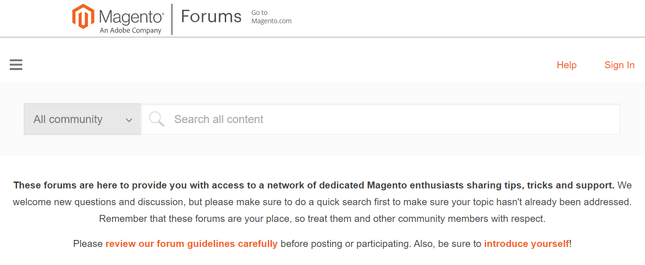
Blending Magento and WordPress: A Symphony of Ecommerce and Content
Is it possible, you ask, to harness the collective power of Magento and WordPress? To merge the artistry of blogging with the finesse of ecommerce? Indeed, it is! Picture this: your WordPress blog, a canvas that vividly narrates your products' stories, seamlessly intertwined with your Magento store, ensuring your customers never have to stray. It's the epitome of having your cake and eating it too!
Instruments of integration like FishPig are your allies here, enabling a fusion of WordPress and Magento themes and features. Imagine orchestrating a fluid journey from blog to cart, where products showcased on your WordPress realm are but a click away from the customer's Magento shopping cart. While the symphony of Magento and WordPress integration may be a fresh melody in the digital space, it's a composition brimming with potential!
Magento vs WordPress: The Closing Act
Ascend for a final overview In the grand theatre of website building, both Magento and WordPress perform with elegance, offering secure, scalable stages for your digital aspirations. However, the spotlight will shine more favorably depending on your priorities. Shall we revisit the acts?
Magento vs WordPress: The Diverging Paths
Ease of Use – WordPress takes the crown for simplicity and user-friendliness. Ecommerce – Magento stands unrivaled as the powerhouse of online commerce. Marketing and Content Management – WordPress emerges as the maestro of content orchestration and marketing. Themes and Design – WordPress dazzles with superior free themes, while Magento's premium themes exude professionalism.
Magento vs WordPress: The Converging Roads
Security – A shared journey where your hosting provider holds the key to fortification. Help and Support – Both platforms extend a hand through their community forums, guiding you through the digital landscape.
In the final bow, Magento revels in its strength, perfect for sculpting vast empires of ecommerce, whereas WordPress thrives in crafting sites pulsating with rich content and storytelling.
The choice, dear visionary, hinges on the world you wish to build. So, which stage calls to you?



